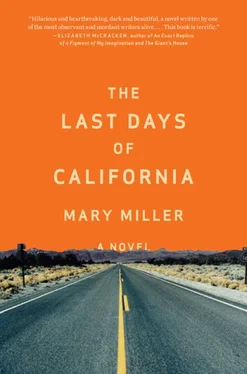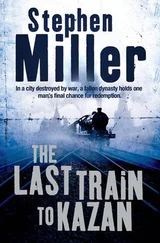The men moved fast, like they’d done this a hundred times, but then there was some problem getting the donut on and they stood around looking at it, forming a tight little circle so we couldn’t see what was going on. It wouldn’t take much for them to steal our money and our car, to kill us. Or they could simply change our tire and get us back on the road, our faith in humanity restored. Both options seemed equally likely. I imagined them discussing how it was going to go down, which one of them would make the transition from nice guy to killer.
Elise pinched my leg, and my mother and father, standing above us, waited for the judgment. I imagined them asking us to turn around. Elise and I would stand, slowly, so slowly, and my father would take my hand and then we would all take each other’s hands. We would remember in this moment how much we loved one another, how we would do anything to spare even one of us. But then the tire was in the trunk and the spare was on and my mother was offering them bottles of water. My father took out his wallet and tried to give them forty dollars, which they refused.
“This spare’s about had it,” the older man said, kicking it with his boot. “Where you headed?”
“Oakland,” my father said.
“You’ve got a long way to go.”
“We’re on a pilgrimage,” I said. “For the rapture.”
The men continued to stand there, nodding and smiling with their hands in their pockets.
“The end times?” I said.
The one who was supposed to pull out a gun or a knife was hesitant now, unwilling. I smiled above them, into the sun. I was good. I was a good girl.
“All right,” one of the young ones said.
“Y’all be safe,” said the other.
When they pulled onto the road with a wave, Elise and I stood and brushed ourselves off.
We got in our car and sat there, letting them put distance between us. I ran my fingernail back and forth against the seat, making a nice little pattern like a freshly mown lawn.
“Is everything okay?” my mother asked.
“It’s fine,” my father said, agitated. He pulled onto the road, but he wouldn’t drive over fifty and kept talking about where we were going to get a tire. There weren’t any tire stores out here; there wasn’t anything out here. As if to help him, I dutifully watched out the window for signs of life. The interstate markers ticked by and the signs preceding each exit let us know there was no reason to stop. Sometimes the signs were completely blank except for the words “gas” or “food.”
I got out my phone and typed Gabe a message. I erased it and tried again. Nothing said what I wanted to say. Everything sounded generic, boring. I might as well have used the prewritten messages. I put my phone away and listened to my Heaven mix: “Tears in Heaven,” “Knockin’ on Heaven’s Door,” “Stairway to Heaven,” “Heaven Is a Place on Earth.” I’d made the mistake of limiting myself to songs with the word “Heaven” in the title whereas Elise had just gone with theme.
“What are you listening to?” Elise asked.
“Belinda Carlisle.”
“Man, your mix sucks.”
“Let’s trade,” I said, offering her my hot pink iPod. I’d regretted choosing pink the moment I’d stepped out of the Apple store.
“I’m listening to the Dalai Lama right now,” she said, and leaned her head against the window, closed her eyes.
I found a comfortable position and closed my eyes, too. I thought about my job—at least I wasn’t at work. I already wanted to quit even though I’d only been there a month and a half. I had to haul huge blocks of ice from the freezer in the back of the store to the machine at least six times a day. The rest of the time, I stood at the window, taking orders and making snow cones for bratty kids and their young mothers. I didn’t like those mothers, how they assumed doors would be held for them and everyone would get out of their way because they had small children. I liked the boy who worked there, though, watching him change lightbulbs and move boxes around, and I liked the lady with the fake blue contacts who melted Nestlé’s and poured it into molds. Her irises were an unnatural shade and there was a ring of dark brown around her pupils that made her seem alien.
After a while, my thoughts stopped making sense, but instead of slipping into sleep, I realized my thoughts were no longer making sense and I got so excited I was about to fall asleep that I jarred myself awake.
When I looked out the window again, there were more cars. Two lanes split into three and then four and then more lanes than I’d ever seen. I touched Elise but she was asleep, or pretending to sleep, so I left her alone. It was good to see cars again, good to see Starbucks and Taco Bells and gas stations that people didn’t live in. A mountain range loomed in the distance, growing closer by the second, and the sky was clear except for some thin clouds like the streaks left behind by an airplane.
“Where are we?” I asked.
“El Paso, and Ciudad Juárez is right there to your left,” my father said. “Surely this place is full of tire stores.”
“Look, kids, it’s a shantytown,” Elise said, sitting up. She Googled Ciudad Juárez on her phone, and after the general Wikipedia entry, the first thing that came up was “Female homicides in Ciudad Juárez.” She started reading it aloud, and I covered my ears because I didn’t want to hear about women who were sold into slavery and killed at bus stops. Our cousin was murdered by a man who was never found, who would never be found. She was a drug addict and probably a prostitute and no one had bothered to find her killer. It wasn’t like the TV shows, where detectives worked forty-eight hours straight and became close with the victims’ families. I was sure it was the same with these women: they were poor; they shouldn’t have been out at three o’clock in the morning. They were expendable. People were always saying the world was small but that was only to make it seem less terrifying. The world was so big. I hadn’t realized how big it was until now.
My father got off at an exit and drove along the frontage road. Soon enough, we saw a tire store, the kind of place you don’t see unless you’re looking for it. He parked and we went inside and sat in a glassed-in waiting room with a TV in one corner, outdated magazines, and free coffee. It was like every other carwash and car-repair waiting room in the world, and I thought of all the Saturday mornings I’d spent with my father at Personal Touch. He’d read the newspaper while I watched the men clean and vacuum our car and then we’d go to Krispy Kreme, where I’d get my own bag of doughnut holes. I never thought about calories or fat grams then. I just ate and enjoyed eating and didn’t get on the scale to watch my weight creep up.
It took less than half an hour for the old tire to come off and a new one to be put on, and we were back on the road, my father flying through El Paso, gunning it on the curves. He had once dreamed of being a racecar driver. He’d told me this one night when it was just the two of us having dinner, a rare moment when I’d responded to his questions with answers and he’d rewarded me by telling me something about himself. But it was probably just one of those dreams kids have, like they want to be an astronaut or a garbageman, the kind of thing no one actually wants to be when they grow up.
The downtown skyline was impressive—lots of tall buildings and a mountain backdrop. It was like the Old West, despite how big and concrete everything was. There was something about it that made it feel a million years old.
Soon we were in New Mexico, a state none of us had been to before. Our mother said she’d heard New Mexico had nice rugs; she wouldn’t mind bringing home a nice rug.
Читать дальше












